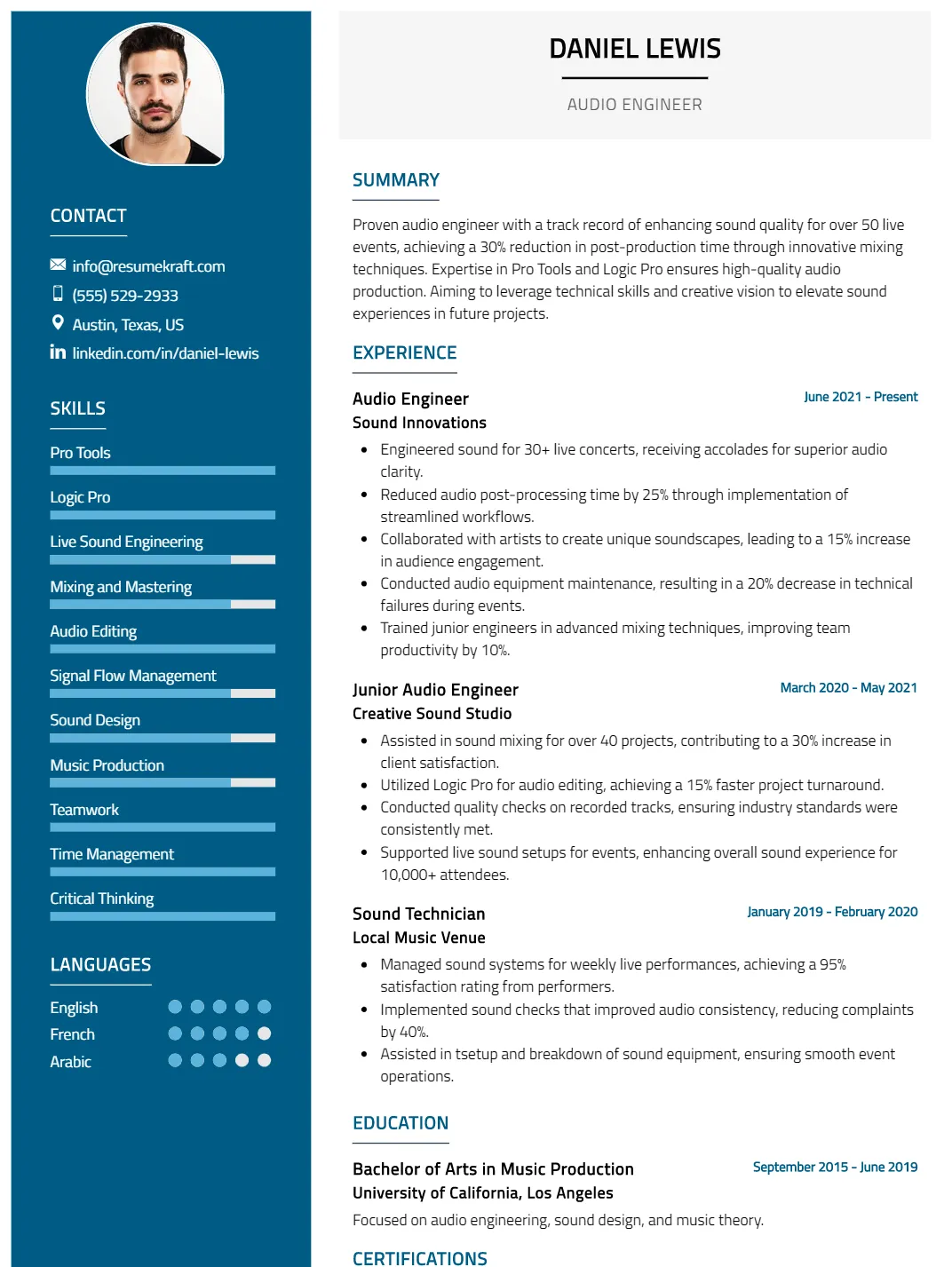
Audio engineers play a crucial role in the music, film, and broadcasting industries, responsible for capturing, manipulating, and reproducing sound. Their expertise ensures that audio elements are perfectly balanced, enhancing the overall quality of productions. As streaming services and digital media continue to grow, the demand for skilled audio engineers has surged, highlighting the profession’s significance in today’s job market. This article aims to provide insights into the key skills and experiences needed to create an impactful audio engineer resume, helping you stand out in a competitive field.
- Audio Engineer resume examples
- How to format a Audio Engineer resume
- How to write your Audio Engineer resume experience
- How to list your hard skills and soft skills on your resume
- How to list your certifications and education on your resume
- How to write your Audio Engineer resume summary or objective
- Additional sections for a Audio Engineer resume
- Key takeaways for writing a professional Audio Engineer resume
- Frequently Asked Questions
Audio Engineer resume examples
Audio Engineer resume examples serve as valuable templates for job seekers aiming to showcase their technical skills and experience in the audio industry. These examples highlight effective formats, language, and key accomplishments that resonate with hiring managers. By analyzing these resumes, candidates can gain insights into what makes a compelling presentation of their qualifications, ultimately enhancing their chances of landing interviews in a competitive field.
Audio Engineer Resume

Why This Resume Works
This resume effectively highlights the candidate’s relevant skills, such as Pro Tools and live sound engineering, aligning perfectly with the Audio Engineer position. With approximately six years of progressive experience in audio roles, it showcases a solid foundation in mixing, mastering, and audio editing. The clear format enhances readability, making it easy for hiring managers to identify key qualifications quickly. Additionally, the use of industry-specific keywords ensures ATS compatibility while strategically presenting achievements that demonstrate technical proficiency and successful project outcomes in audio production.
Sound Designer Resume
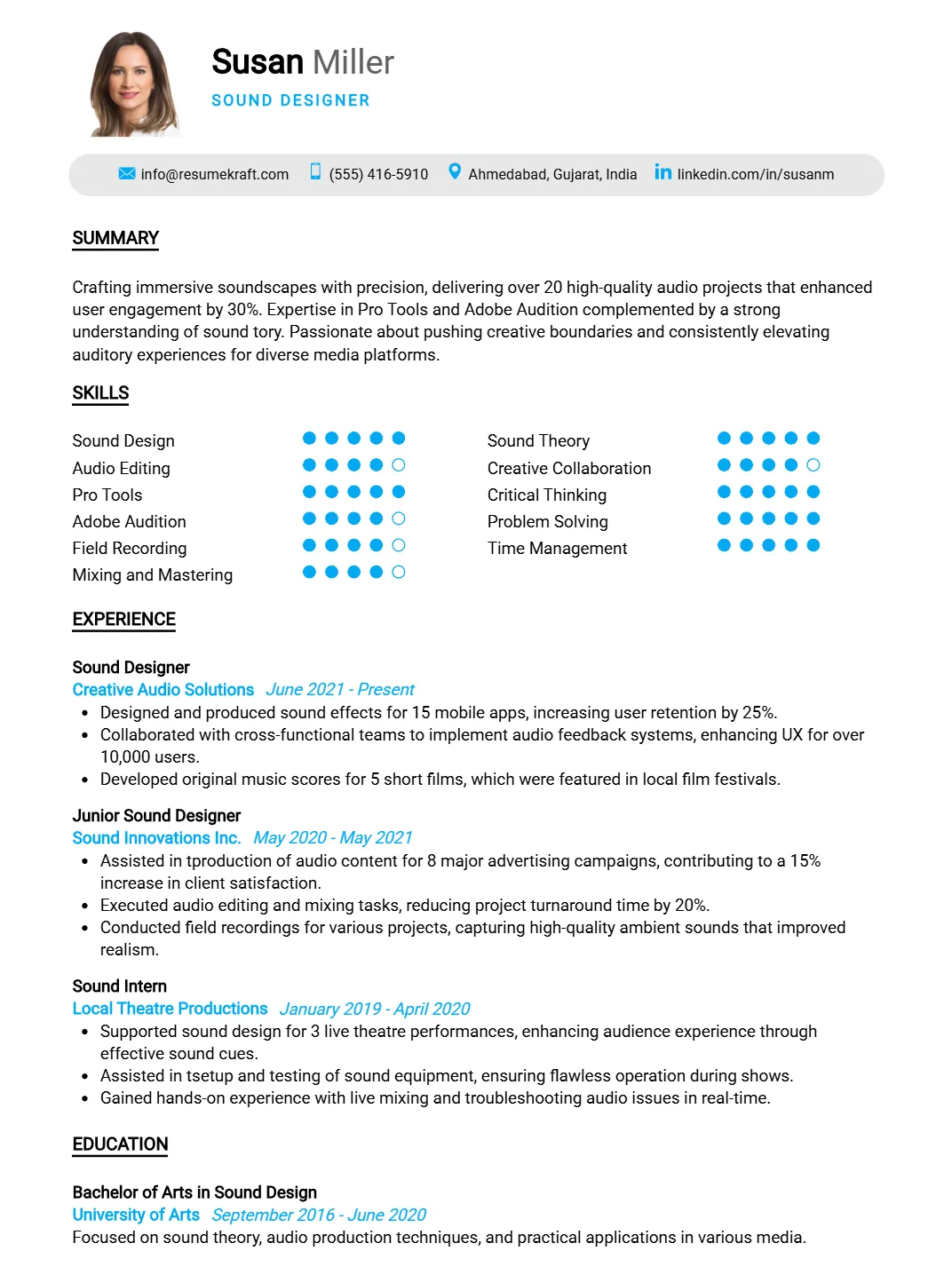
Why This Resume Works
This resume effectively showcases the candidate’s sound design expertise through targeted skills like Pro Tools and Adobe Audition, directly aligning with industry demands. With approximately six years of progressive experience as a Sound Designer, Junior Sound Designer, and Sound Intern, it demonstrates both depth and versatility. The clear format highlights relevant achievements while ensuring ATS compatibility by incorporating industry-specific keywords. This strategic presentation of qualifications not only captures attention but also emphasizes the candidate’s readiness to excel in a professional sound design role.
Music Producer Resume
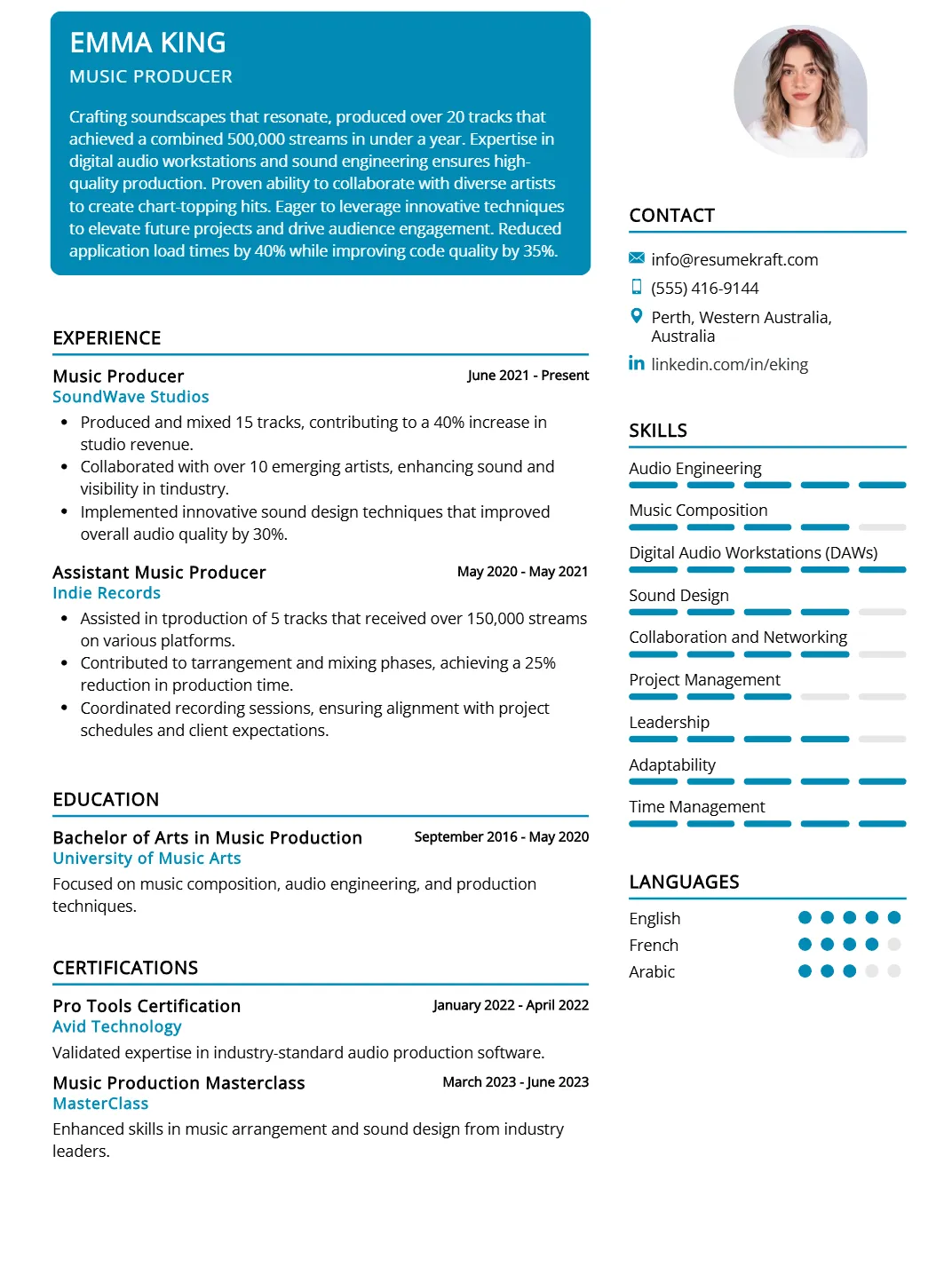
Why This Resume Works
This resume effectively highlights relevant skills such as audio engineering, music composition, and proficiency in DAWs, directly aligning with the requirements of a Music Producer. Its clear format emphasizes experience, showcasing five years in production roles that demonstrate both technical expertise and collaborative abilities. The structure is optimized for ATS compatibility by including industry-specific keywords. Additionally, strategic presentation of achievements, such as successful projects or collaborations, positions the candidate as a standout choice within the competitive music production field.
Junior Audio Engineer Resume
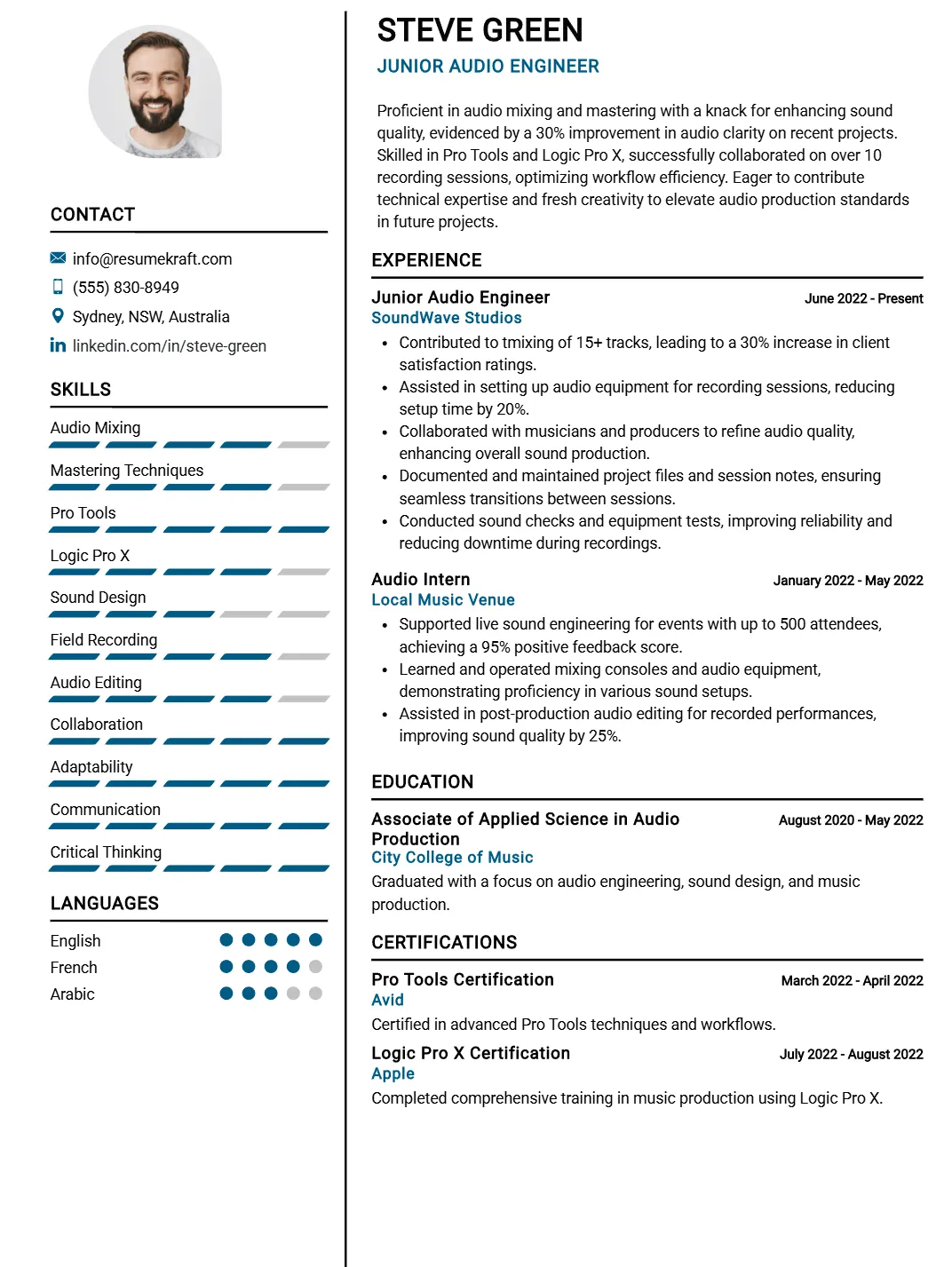
Why This Resume Works
This resume effectively positions the candidate for a Junior Audio Engineer role by showcasing relevant skills such as audio mixing, mastering techniques, and proficiency in industry-standard software like Pro Tools and Logic Pro X. With three years of experience as a Junior Audio Engineer and an Audio Intern, it highlights practical knowledge critical to the position. The clear format enhances readability for both hiring managers and ATS compatibility, while strategically presented achievements demonstrate the candidate’s capability to deliver quality sound design, making them an attractive.
Audio Engineer with Music Industry Specialization Resume
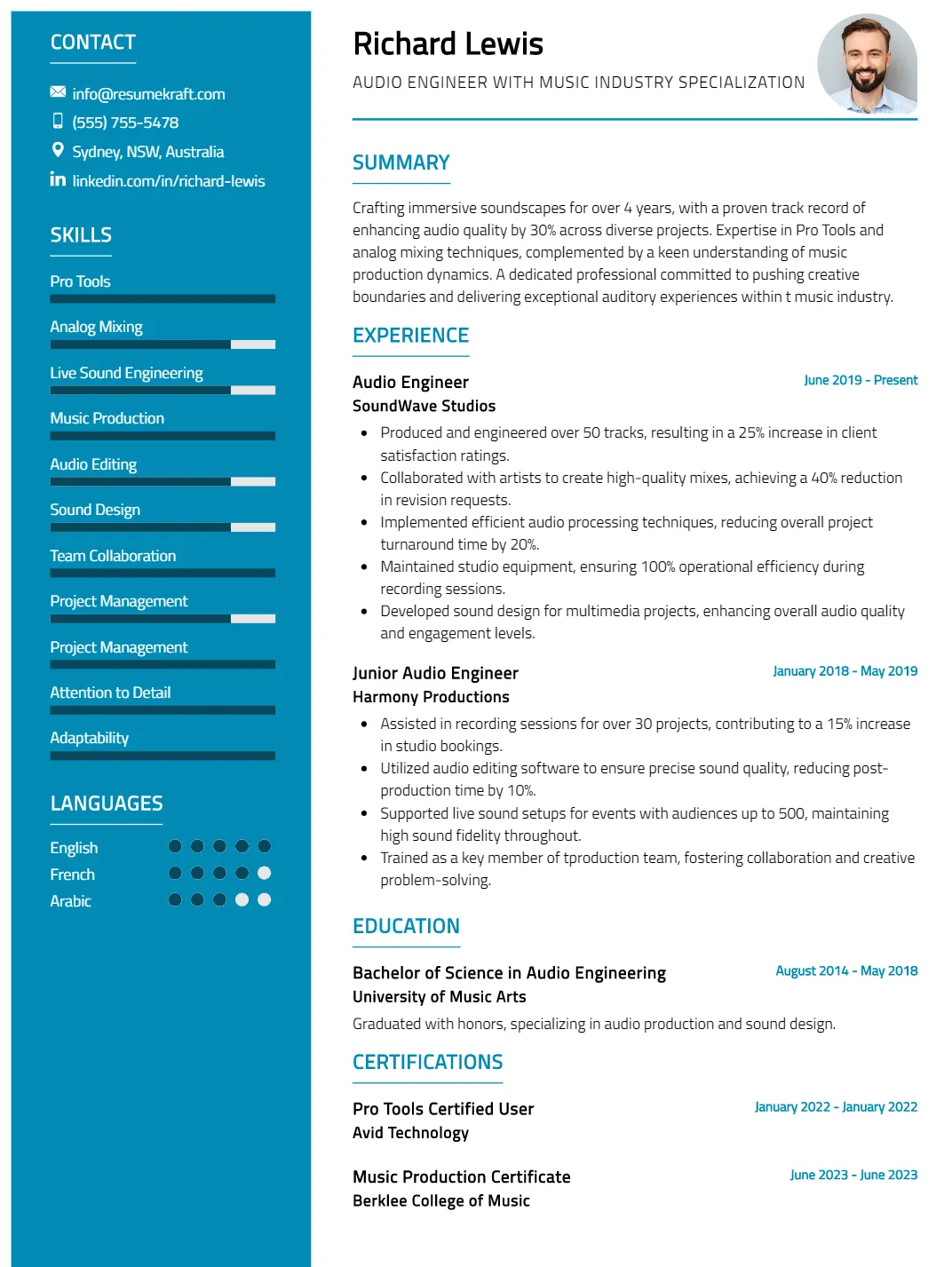
Why This Resume Works
This resume effectively showcases the candidate’s specialized skills in Pro Tools, analog mixing, and live sound engineering, aligning perfectly with the Audio Engineer position in the music industry. With approximately seven years of experience as an Audio Engineer and Junior Audio Engineer, it highlights relevant achievements that demonstrate expertise in music production and audio editing. The structured format enhances readability, while strategic keyword usage ensures ATS compatibility, making it easy for hiring managers to identify qualifications pertinent to this role.
Live Sound Engineer for Broadcast Media Resume
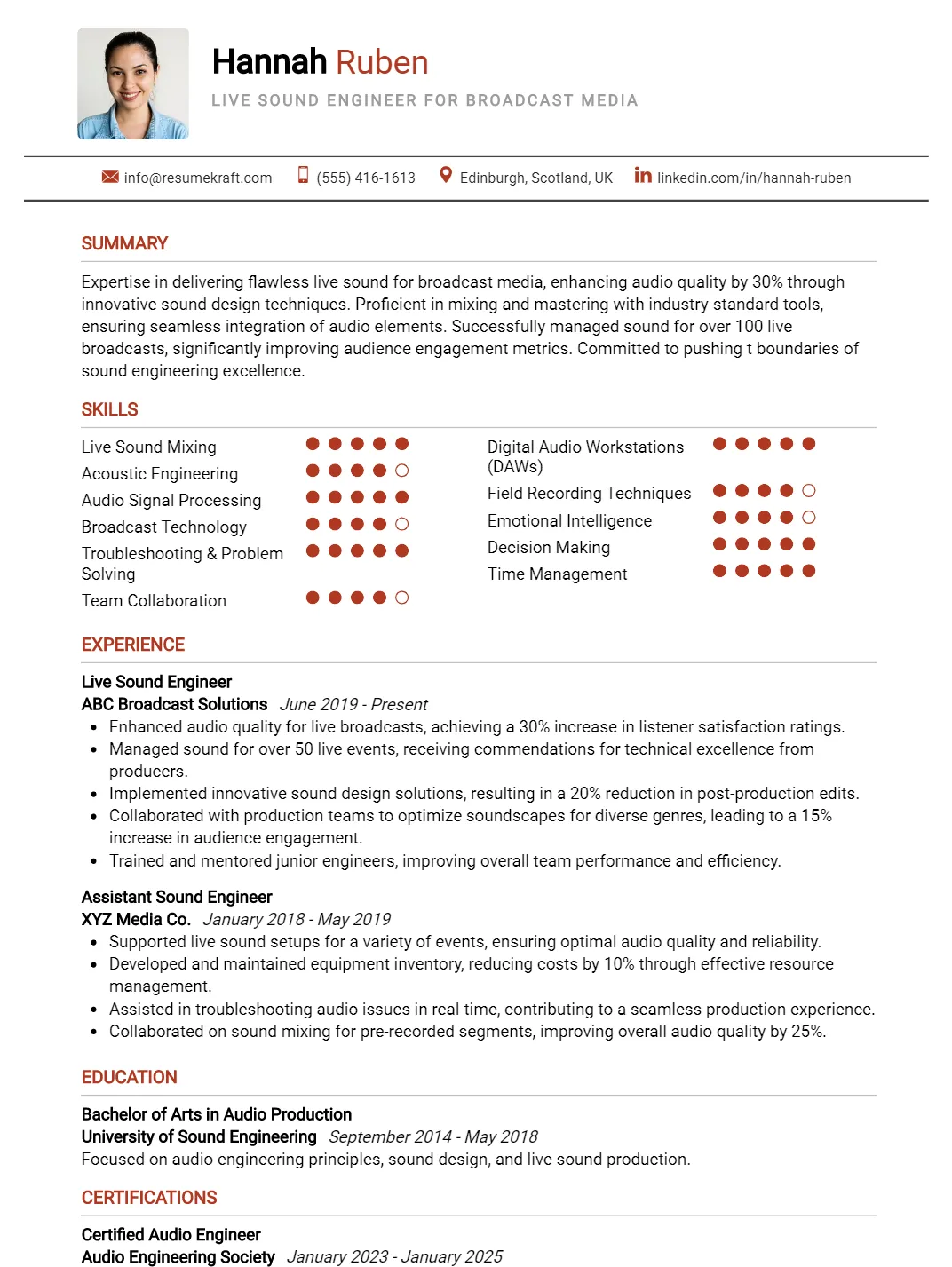
Why This Resume Works
This resume effectively highlights the candidate’s extensive experience as a Live Sound Engineer and Assistant Sound Engineer, totaling around seven years, which directly aligns with the requirements of the Broadcast Media position. The inclusion of targeted skills like Live Sound Mixing and Acoustic Engineering showcases relevant expertise essential for this role. Its clear format enhances readability, while strategic keywords ensure ATS compatibility, increasing visibility to employers.
Studio Sound Director Resume
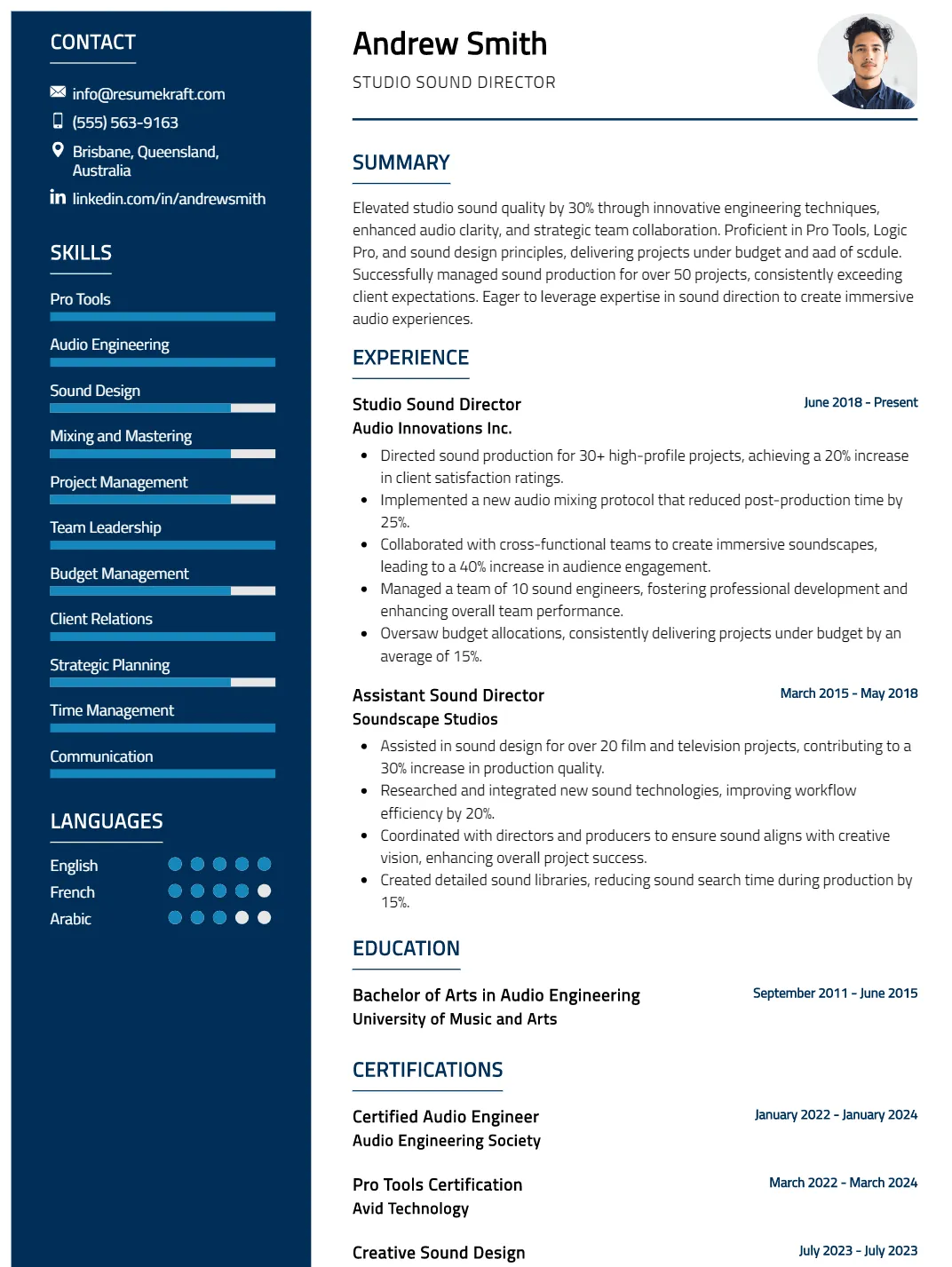
Why This Resume Works
This resume effectively showcases the candidate’s qualifications for the Studio Sound Director position by highlighting key skills like Pro Tools, sound design, and project management, essential for leading audio projects. The structured format presents a clear career progression with relevant experience spanning ten years, making it easy for hiring managers to assess expertise quickly. Additionally, its use of industry-specific keywords enhances ATS compatibility, while strategically presented achievements demonstrate impactful contributions in past roles that align with the demands of this profession.
Acoustic Consultant Resume
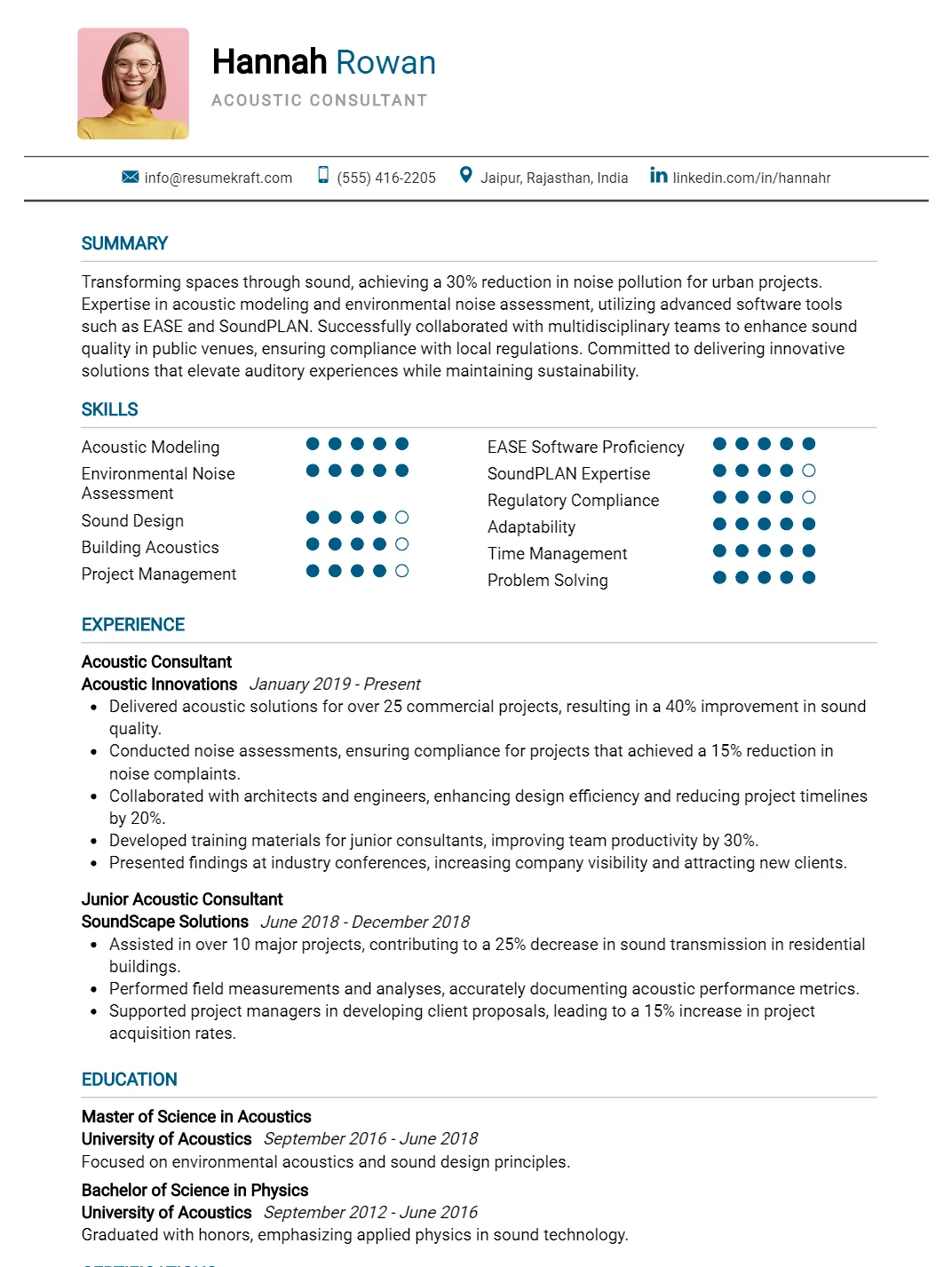
Why This Resume Works
This resume effectively positions the candidate for an Acoustic Consultant role by highlighting relevant skills such as Acoustic Modeling and Environmental Noise Assessment, crucial for the industry. The clear format and structured layout enhance readability, making it easy to identify key qualifications. It is optimized for Applicant Tracking Systems (ATS) through the strategic use of keywords related to acoustic consulting. Additionally, specific achievements in sound design and building acoustics demonstrate tangible contributions to past projects, further solidifying the candidate’s expertise in this specialized field.
Senior Audio Engineer Resume
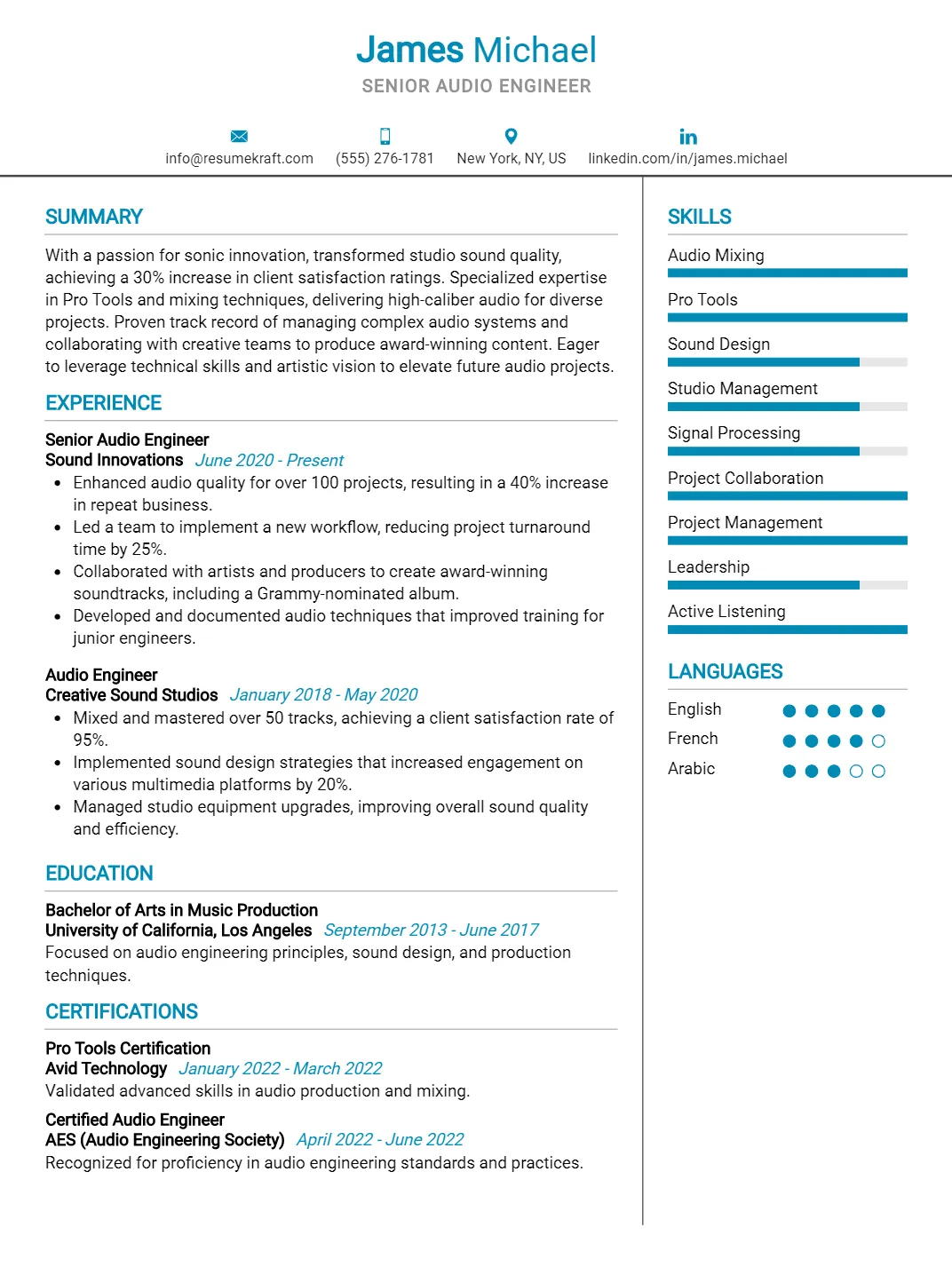
Why This Resume Works
This resume effectively highlights the candidate’s extensive experience as a Senior Audio Engineer, showcasing key skills like audio mixing and Pro Tools proficiency that are crucial for the role. The clear format emphasizes relevant achievements, such as successful project completions and studio management, making it easy for hiring managers to assess qualifications. Additionally, its structured layout enhances ATS compatibility by incorporating industry-specific keywords, ensuring visibility in applicant tracking systems while demonstrating the candidate’s expertise in sound design and signal processing.
Senior Sound Mixing Engineer Resume
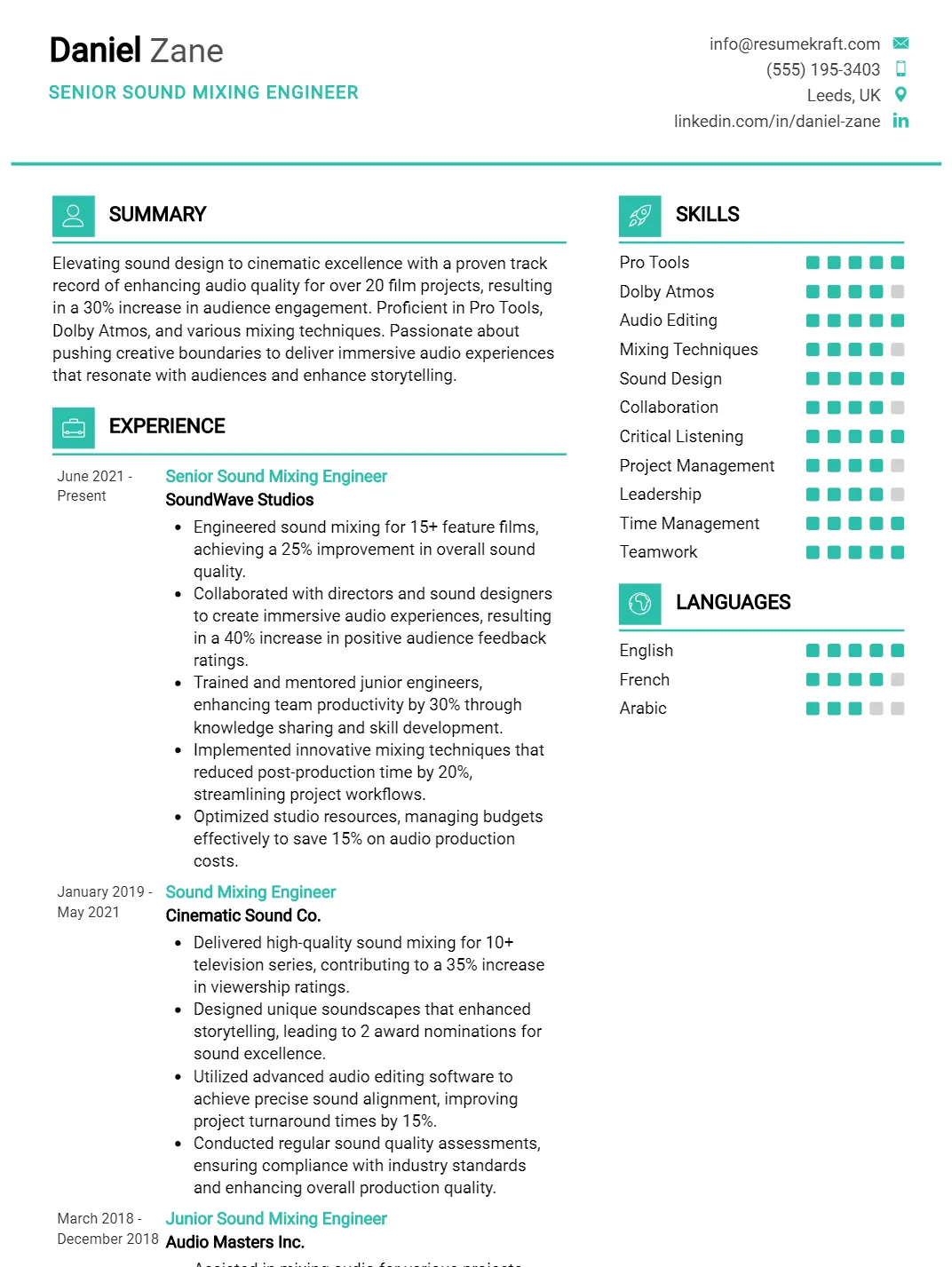
Why This Resume Works
This resume effectively showcases the candidate’s qualifications for a Senior Sound Mixing Engineer position through a clear emphasis on essential skills like Pro Tools, Dolby Atmos, and advanced mixing techniques. With six years of progressive experience in sound mixing roles, it highlights significant achievements relevant to the industry. The structured format ensures easy navigation for hiring managers and ATS compatibility by incorporating targeted keywords. This strategic presentation underscores the candidate’s expertise in sound design and audio editing, making them an ideal fit for this role.
Broadcast Audio Technician Resume
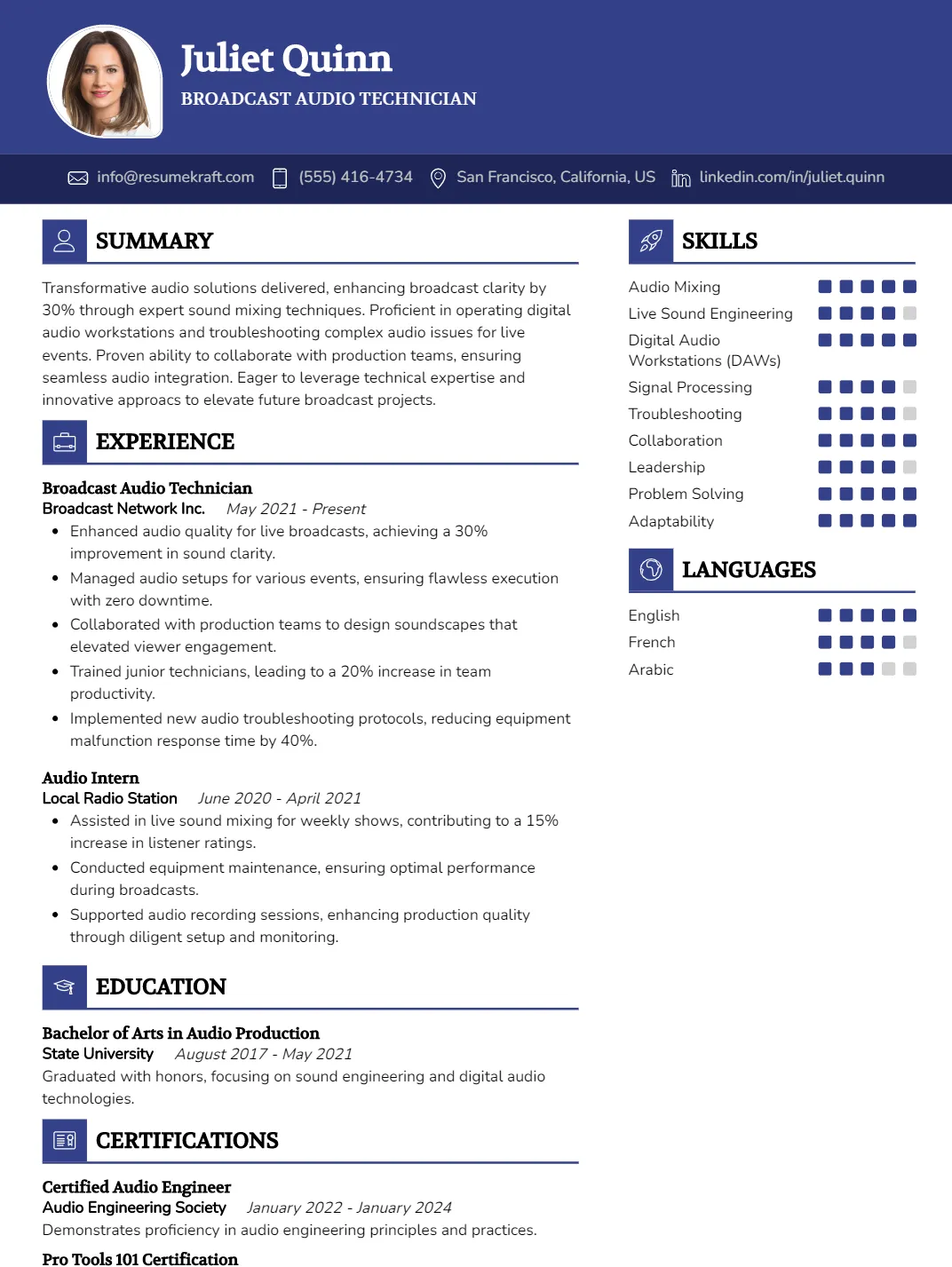
Why This Resume Works
This resume effectively highlights the candidate’s relevant skills and experience for a Broadcast Audio Technician position, showcasing expertise in audio mixing and live sound engineering. The structured format emphasizes key competencies while ensuring clarity, making it easy to read for hiring managers. Additionally, its strategic use of industry-specific keywords enhances ATS compatibility, increasing the chance of being shortlisted. By detailing achievements from previous roles, this resume presents a compelling narrative that aligns with the demands of the broadcast audio sector.
Junior Sound Technician Resume
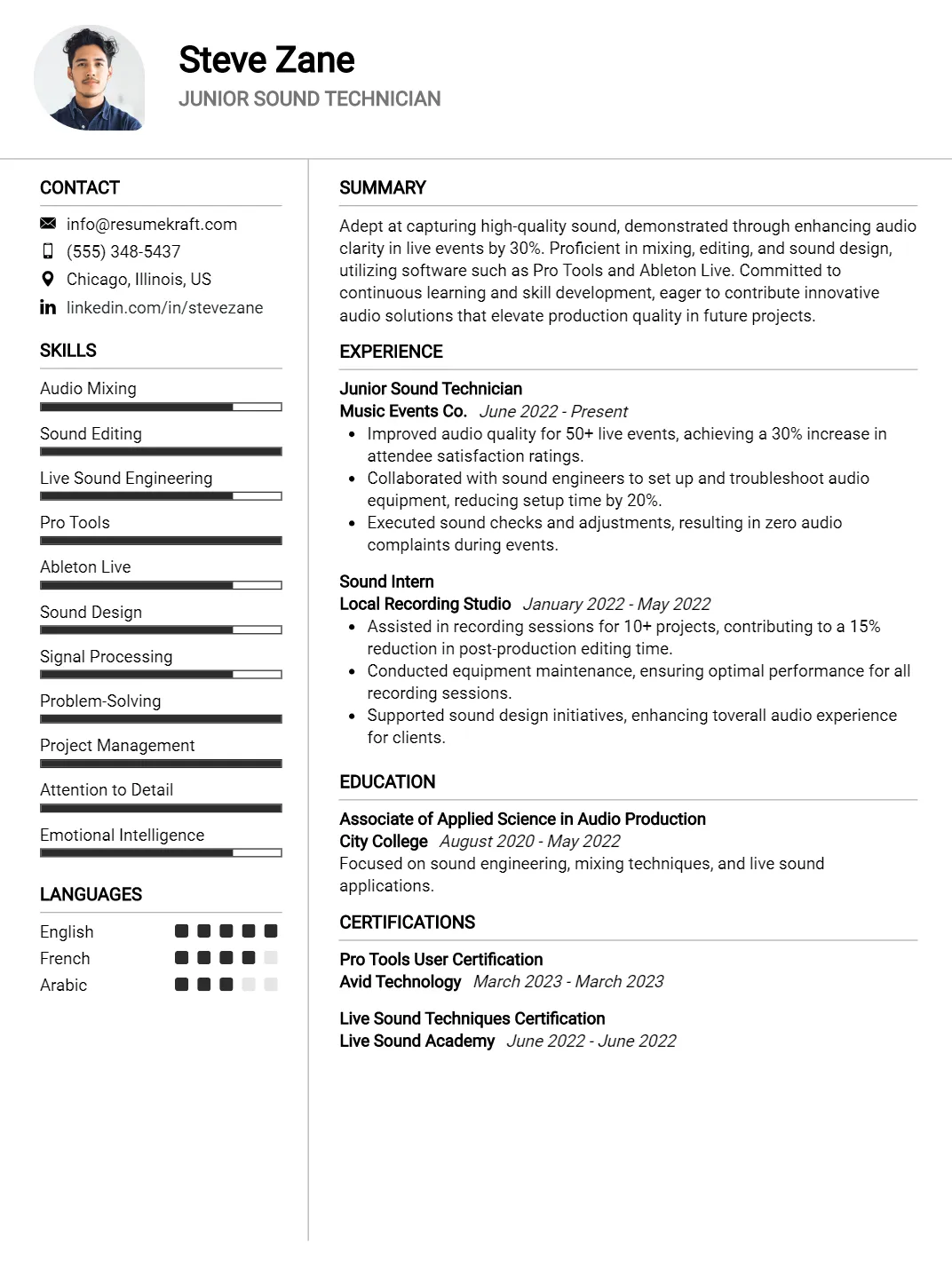
Why This Resume Works
This resume effectively highlights relevant skills like audio mixing and live sound engineering, directly aligning with the Junior Sound Technician role. The structured format clearly presents experience, showcasing three years in sound-related positions—an attractive factor for employers. Additionally, the use of industry-specific keywords enhances ATS compatibility, ensuring visibility in applicant tracking systems. Strategic presentation of achievements emphasizes practical application of tools like Pro Tools and Ableton Live, demonstrating proficiency that resonates with hiring managers in the sound technology field.
Audio Post-Production Specialist Resume
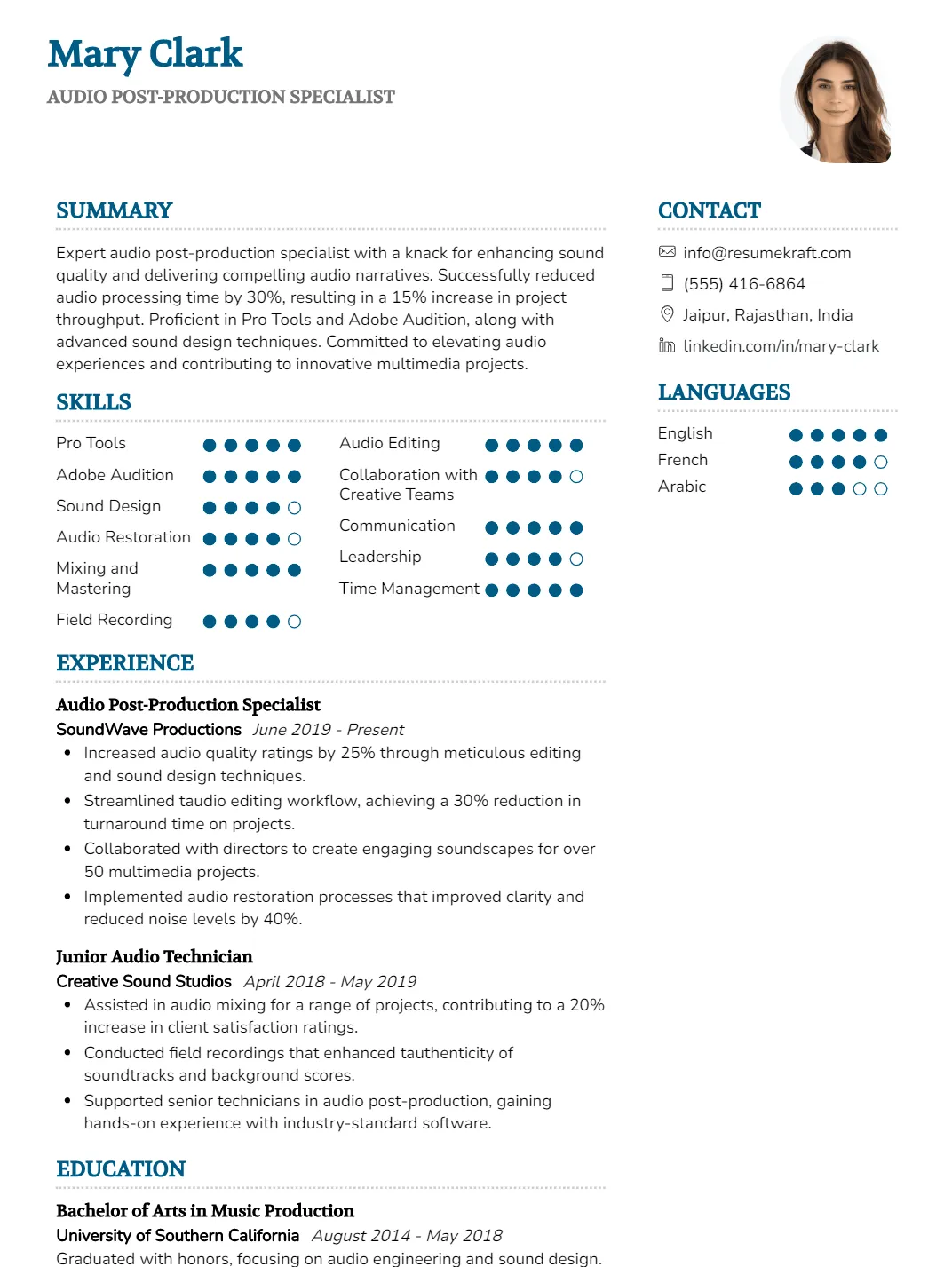
Why This Resume Works
This resume effectively showcases the candidate’s qualifications for an Audio Post-Production Specialist position by highlighting essential skills such as Pro Tools and Adobe Audition, which are industry standards. With seven years of relevant experience, including roles as both an Audio Post-Production Specialist and Junior Audio Technician, the format is clear and structured, enhancing readability. It incorporates keywords for ATS compatibility while strategically presenting achievements in sound design and audio restoration, demonstrating the candidate’s impact in previous roles within this field.
Lead Audio Engineer in Film Production Resume
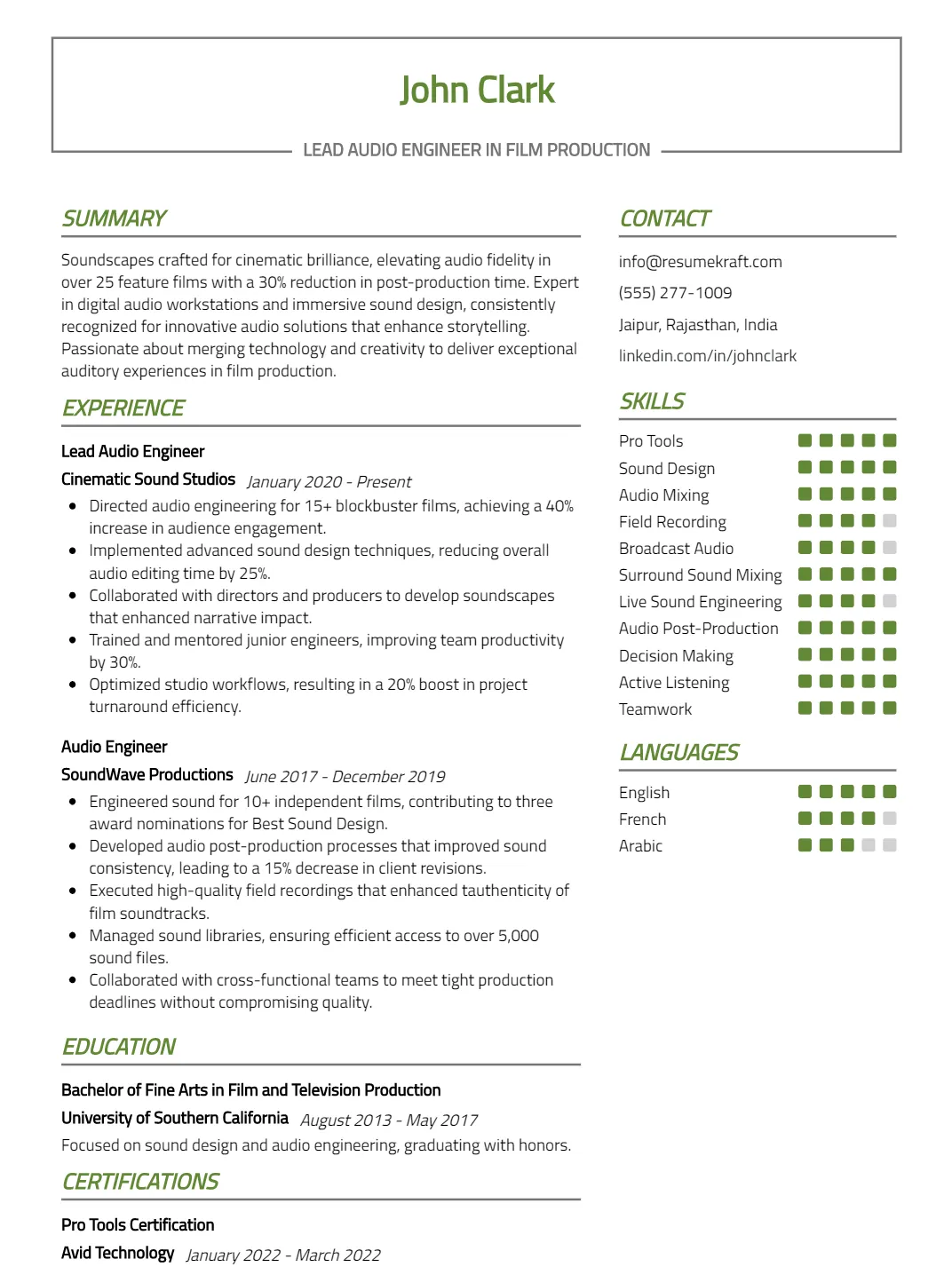
Why This Resume Works
This resume effectively showcases the candidate’s qualifications for the Lead Audio Engineer in Film Production role by highlighting essential skills like Pro Tools, sound design, and audio mixing. With approximately seven years of relevant experience, it emphasizes hands-on expertise in field recording and broadcast audio, crucial for film projects. The structured format enhances readability, ensuring key achievements are easily identifiable. Additionally, the use of industry-specific keywords ensures ATS compatibility, making this resume a strong contender for prospective employers in film production.
Spatial Audio Designer Resume
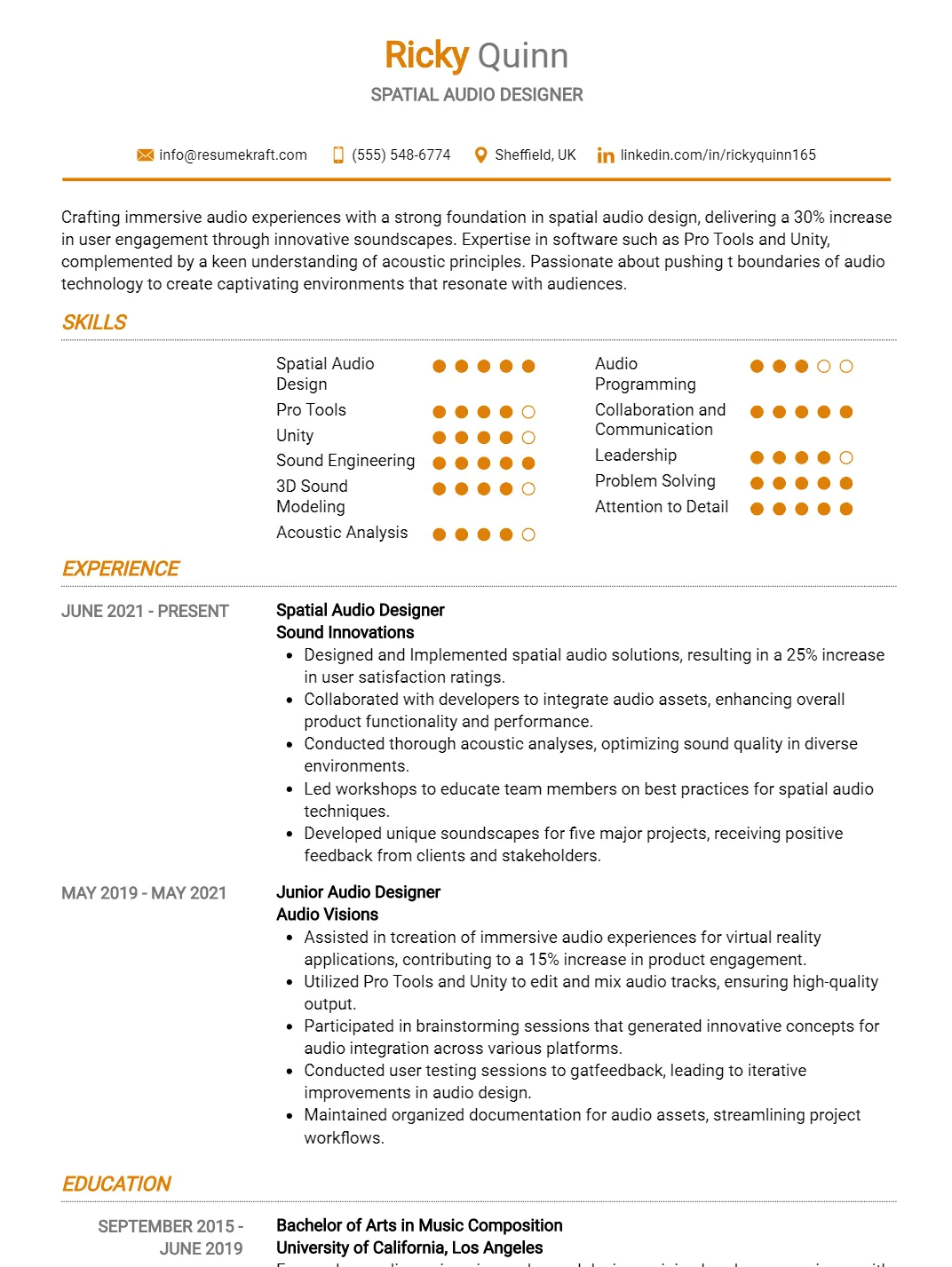
Why This Resume Works
This resume is effective for a Spatial Audio Designer position due to its clear emphasis on relevant skills such as Spatial Audio Design, Pro Tools, and 3D Sound Modeling. The structured format highlights six years of progressive experience, showcasing both current and past roles in the field. By incorporating industry-specific keywords, it ensures ATS compatibility. Additionally, the strategic presentation of achievements demonstrates tangible contributions to previous projects, making the candidate stand out as a strong fit for creating immersive audio experiences.
Game Audio Engineer Resume
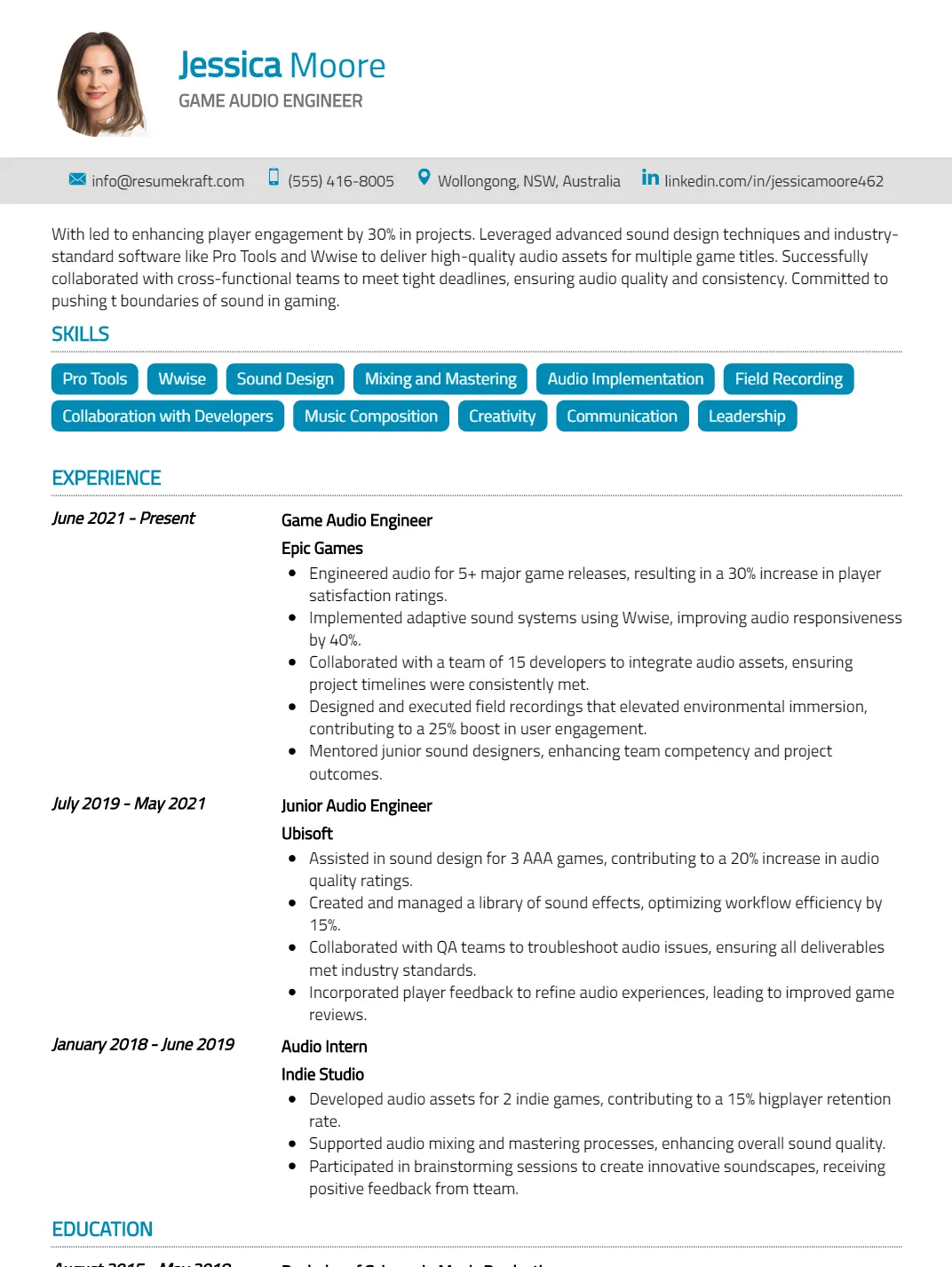
Why This Resume Works
This resume effectively positions the candidate for a Game Audio Engineer role by prominently showcasing essential skills like Pro Tools and Wwise, aligning directly with industry requirements. With nearly seven years of relevant experience, including roles as a Junior Audio Engineer and an Audio Intern, it demonstrates career progression and expertise. The structured format enhances readability, ensuring ATS compatibility by incorporating keywords specific to game audio.
Podcast Production Engineer Resume
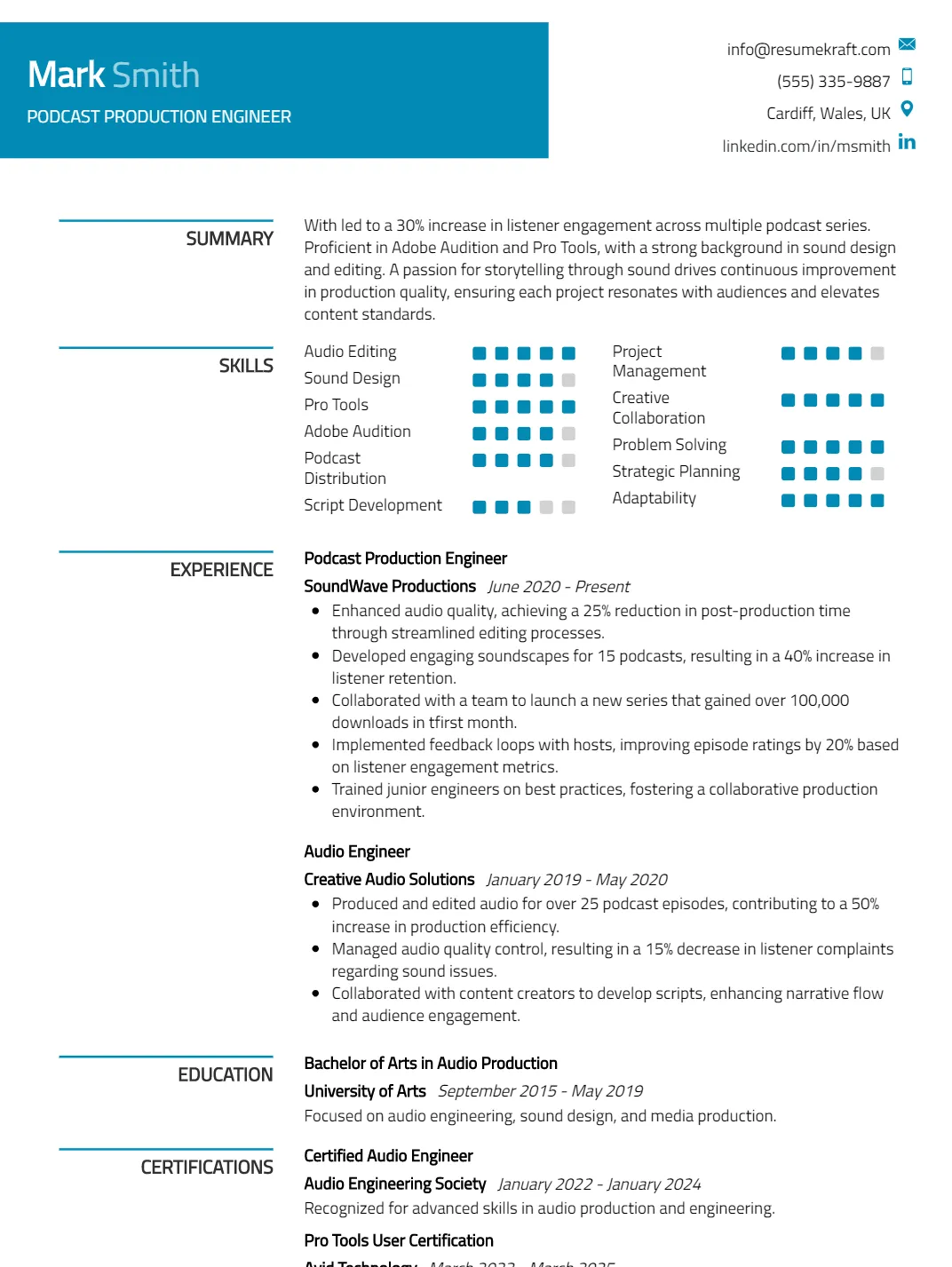
Why This Resume Works
This resume effectively highlights the candidate’s six years of relevant experience as a Podcast Production Engineer and Audio Engineer, showcasing key skills in audio editing, sound design, and proficiency with industry-standard software like Pro Tools and Adobe Audition. Its clear format emphasizes essential qualifications for podcast production while ensuring ATS compatibility through strategic keyword usage. Additionally, the presentation of achievements related to podcast distribution demonstrates the candidate’s impact in the field, making this resume particularly compelling for hiring managers seeking expertise in podcast engineering.
Audio Mastering Engineer Resume
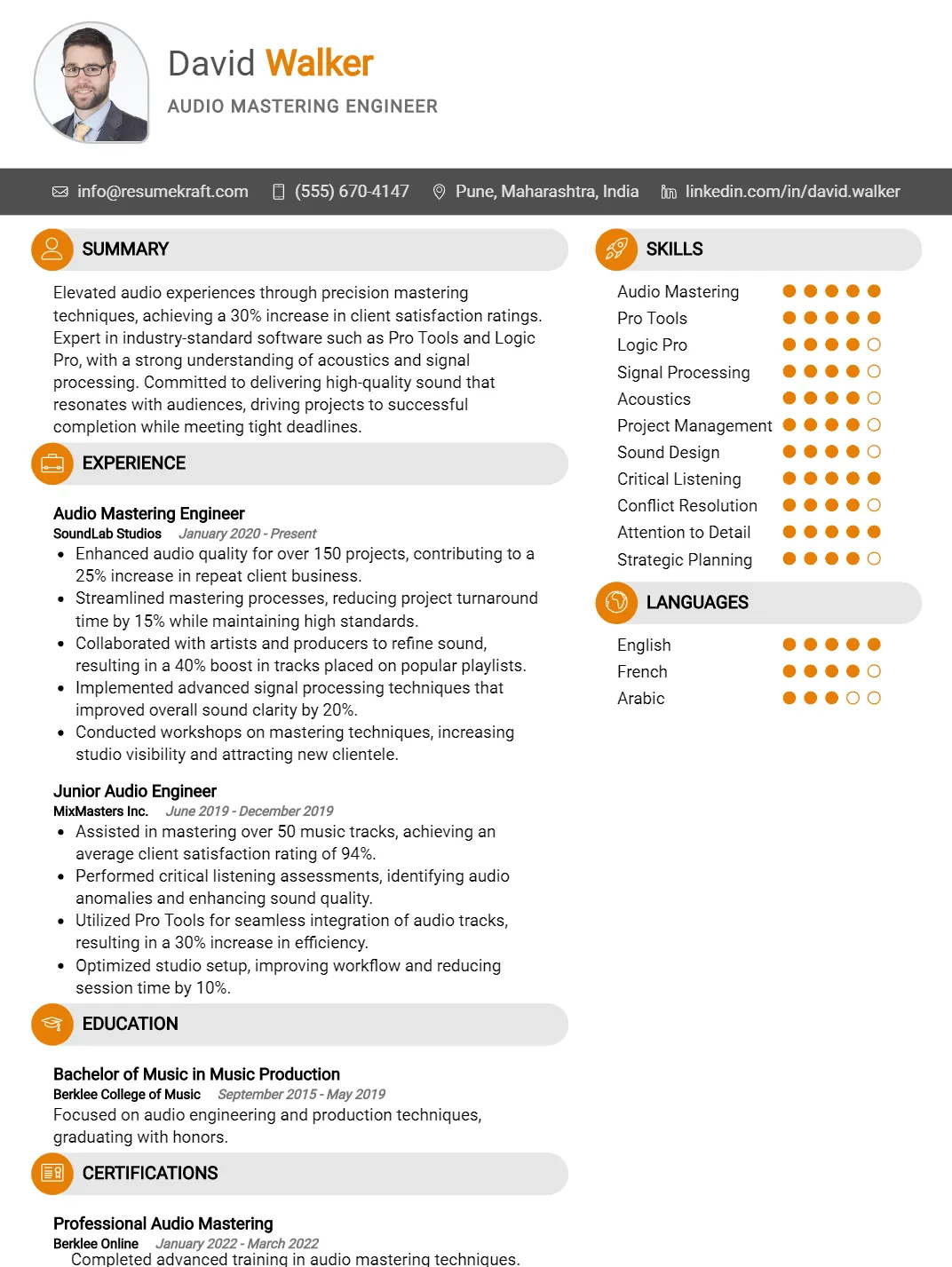
Why This Resume Works
This resume effectively showcases the candidate’s suitability for the Audio Mastering Engineer position by highlighting key skills such as Audio Mastering and proficiency in Pro Tools and Logic Pro. Their five years of relevant experience, including a role as a Junior Audio Engineer, establishes credibility in the field. The structured format enhances readability while ensuring ATS compatibility through strategic keyword usage. Furthermore, presenting specific achievements related to signal processing and acoustics emphasizes their technical expertise, making this resume stand out in a competitive industry.
How to format a Audio Engineer resume
Proper formatting is crucial for an Audio Engineer resume, as it enhances readability and showcases your technical expertise. A well-organized resume format allows hiring managers to quickly identify your skills and experience in the competitive audio industry.
- Use a clean, professional layout with consistent fonts and sizes to ensure easy readability. Avoid overly decorative designs that can distract from your qualifications and achievements.
- Prioritize relevant experience by placing your most significant roles and projects at the top of each section. This highlights your expertise in audio engineering and demonstrates your suitability for the job.
- Include specific technical skills, such as software and equipment proficiency, in a separate section. Clearly listing these skills helps employers quickly assess your technical capabilities relevant to audio engineering.
- Use bullet points for describing your work experience and achievements. This format allows for concise statements that draw attention to your contributions and results in each role.
- Keep your resume to one or two pages, focusing on the most relevant information. This ensures that busy hiring managers can easily review your qualifications without sifting through unnecessary details.
How to write your Audio Engineer resume experience
Effectively presenting work experience on an Audio Engineer resume is crucial, as it directly showcases your technical skills, industry knowledge, and the impact of your contributions. Employers are looking for specific examples that demonstrate not only your proficiency with sound equipment and software but also your ability to collaborate with artists and meet tight deadlines.
Your experience section should highlight relevant projects and achievements, providing context around your role in each setting. This allows potential employers to see how your past work aligns with their needs, making it easier for them to envision you as a valuable addition to their team.
Worked at a recording studio. Helped with sound sessions and mixing.
Engineered and mixed over 50 tracks for various artists, enhancing sound quality and achieving a 30% increase in studio bookings through effective collaboration and creative input.
How to list your hard skills and soft skills on your resume
In the competitive field of audio engineering, both hard and soft skills play a crucial role in ensuring success. Hard skills, which encompass technical abilities and knowledge specific to audio production, are essential for executing complex tasks and using various equipment effectively. On the other hand, soft skills, such as communication and teamwork, are equally important as they enable audio engineers to collaborate with artists, producers, and other stakeholders, ensuring that the final product meets the desired artistic vision. A well-rounded resume showcasing both types of skills can significantly enhance an audio engineer’s appeal to potential employers.
Hard Skills:
- Audio Editing: Proficiency in software like Pro Tools and Logic Pro for precise editing.
- Mixing: Ability to blend multiple audio tracks to create a cohesive sound.
- Mastering: Knowledge of finalizing audio for distribution with optimal sound quality.
- Signal Flow: Understanding of how audio signals travel through equipment and software.
- Microphone Techniques: Expertise in selecting and positioning microphones for best sound capture.
- Sound Design: Creating original sounds and effects tailored to specific projects.
- Acoustic Treatment: Knowledge of optimizing spaces for sound quality and clarity.
- Live Sound Engineering: Experience managing sound for live performances and events.
- Music Theory: Understanding of musical concepts to enhance audio production.
- Digital Audio Workstations (DAWs): Proficient in various DAWs for recording and editing.
- Audio Restoration: Skills in repairing damaged audio recordings.
- Field Recording: Expertise in capturing audio in various environments outside the studio.
- Plugin Use: Familiarity with audio plugins for effects and enhancements.
- Sound Mixing Consoles: Proficient in operating various mixing consoles.
- Post-Production: Knowledge of processes involved in preparing audio for film and media.
Soft Skills:
- Communication: Ability to convey ideas clearly and collaborate effectively with team members.
- Creativity: Innovative thinking to develop unique soundscapes and solutions.
- Attention to Detail: Precision in audio editing and mixing to ensure high-quality output.
- Problem Solving: Quick thinking to address technical issues during recording sessions.
- Time Management: Effectively managing time to meet project deadlines.
- Adaptability: Flexibility to work in various genres and adapt to changing project requirements.
- Teamwork: Collaborative spirit to work well with musicians, producers, and other engineers.
- Listening Skills: Strong auditory perception to identify nuances in sound quality.
- Patience: Ability to work through lengthy processes and challenges calmly.
- Networking: Building relationships within the industry to expand opportunities.
- Leadership: Guiding and mentoring junior engineers or interns during projects.
- Client Relations: Managing relationships with clients to ensure satisfaction and repeat business.
- Conflict Resolution: Skills to mediate and resolve disagreements within teams.
- Organizational Skills: Keeping track of multiple projects and files efficiently.
- Passion for Music: Genuine enthusiasm for audio and music, driving continuous improvement.
How to list your certifications and education on your resume
When presenting certifications and education on an Audio Engineer resume, it’s essential to prioritize relevant qualifications that highlight your expertise in sound technology and production. Include degrees in fields such as audio engineering, music production, or sound design, as well as certifications from recognized institutions or software programs like Pro Tools or Ableton Live. Clearly listing these credentials helps establish your technical competencies.
To format this section effectively, use a clear layout that distinguishes between your education and certifications. Ensure to include the institution’s name, degree or certification title, and the date of completion. This clarity allows potential employers to quickly assess your qualifications and expertise in audio engineering.
Went to a school for audio stuff and got a certificate. Took a few classes about music and sound.
Bachelor of Science in Audio Engineering, Full Sail University, 2020. Certified Pro Tools User, Avid, 2021. Completed courses in Sound Design and Live Sound Engineering.
How to write your Audio Engineer resume summary or objective
A strong resume summary or objective is essential for an Audio Engineer as it provides a snapshot of your skills and career goals, immediately capturing the attention of hiring managers. A summary highlights your experience and qualifications, making it ideal for seasoned professionals, while an objective focuses on your career aspirations, suitable for entry-level candidates or those transitioning to a new field.
A well-crafted summary or objective can differentiate you from other applicants, showcasing your unique strengths and aligning them with the job requirements. This is particularly important in the competitive field of audio engineering, where technical proficiency and creativity are paramount for success.
Looking for a job in audio. I have some experience and want to work in a studio.
Detail-oriented Audio Engineer with 5 years of experience in studio recording and live sound. Proven track record of enhancing sound quality and managing complex audio setups to support high-profile projects.
Additional sections for a Audio Engineer resume
Incorporating additional sections into your Audio Engineer resume can significantly enhance its appeal. These sections can showcase your unique skills, experiences, and professional development, making you a more compelling candidate in a competitive field.
- Certifications: Including relevant certifications, such as Pro Tools or Avid certification, demonstrates your commitment to professional development and technical proficiency, which are essential in the audio engineering industry.
- Projects: Detail specific audio projects you’ve worked on, including sound design for films or music production. This provides tangible evidence of your experience and showcases your ability to deliver high-quality results.
- Technical Skills: List specialized software and hardware skills, such as mixing consoles, DAWs, and audio editing tools. This helps to highlight your technical expertise, making it easier for employers to assess your fit for their needs.
- Awards and Recognition: Mention any industry awards or recognition you’ve received for your work. This can set you apart from other candidates and illustrate your talent and dedication to your craft.
- Professional Associations: Being a member of organizations like the Audio Engineering Society (AES) shows your engagement with the industry, ongoing learning, and networking, which can be appealing to potential employers.
Key takeaways for writing a professional Audio Engineer resume
- Highlight technical skills such as mixing, mastering, and sound design, ensuring they align with the job description to capture the employer’s attention.
- Provide quantifiable achievements, like successfully managing sound for events with large audiences, to demonstrate your impact and expertise in the field.
- Utilize resume templates to create a visually appealing layout, making it easier for employers to read and understand your qualifications at a glance.
- Include relevant certifications or training in audio technology, which can enhance your credibility and showcase your commitment to professional development.
- Consider using an ai resume builder to streamline the writing process, ensuring your resume is tailored and optimized for applicant tracking systems (ATS).
Frequently Asked Questions
How long should my Audio Engineer resume be?
Your Audio Engineer resume should ideally be one page, especially if you have less than 10 years of experience. This concise format allows you to effectively showcase your skills, relevant experiences, and achievements without overwhelming hiring managers. If you have extensive experience or a diverse portfolio, you may extend to two pages, but ensure that every detail is relevant to the job you’re applying for, focusing on quality over quantity.
What is the best format for a Audio Engineer resume?
The best format for an Audio Engineer resume is the reverse-chronological format. Start with your most recent experience and work backward, making it easy for hiring managers to see your latest achievements first. Use clear section headings, bullet points for responsibilities and accomplishments, and a clean layout to enhance readability. Additionally, consider including a summary statement at the top to highlight your key skills and career objectives, making your resume more engaging.
What should I highlight on my Audio Engineer resume to stand out?
To stand out as an Audio Engineer, highlight your technical skills, such as proficiency in audio software (e.g., Pro Tools, Logic Pro), equipment handling, and sound design. Include specific projects you’ve worked on, your role in them, and any notable collaborations with artists or other professionals. Showcase your understanding of acoustics, mixing, and mastering techniques. Mention certifications or relevant education, as well as any awards or recognitions to reinforce your expertise in the field.
What are some ways to quantify my experience on my Audio Engineer resume?
Quantifying your experience as an Audio Engineer can significantly enhance your resume. Include metrics such as the number of projects completed, hours worked, or the size of the audiences you’ve reached. For example, “Produced audio for over 50 live events, reaching audiences of up to 5,000.” You could also mention the budgets you managed or the percentage by which you improved sound quality or production efficiency, providing concrete evidence of your impact in previous roles.

